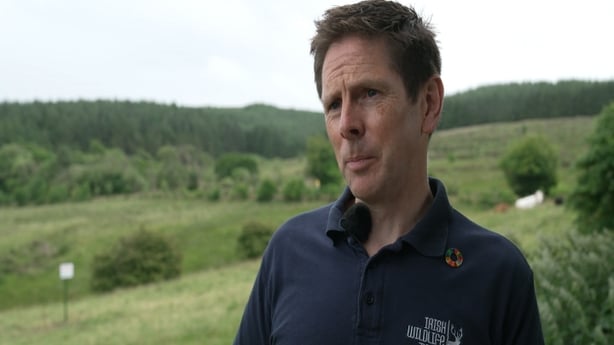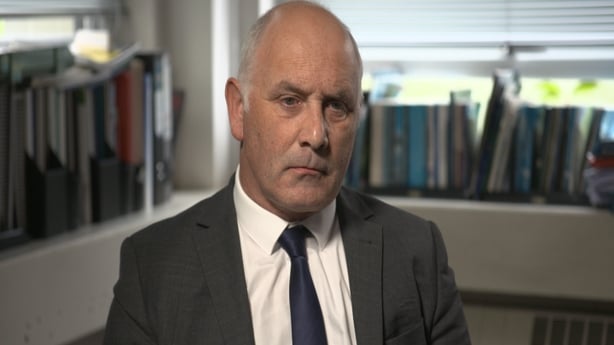The Environment Committee of the European Parliament voted today to block the proposed EU Nature Restoration Law in its current form.
In a split vote, 44 of the 88 committee members today voted against the proposed legislation while the remaining 44 voted in favour of it.
The EU directive was aimed at restoring damaged ecosystems across the continent and has been the source of much debate.
Today's result means the committee will now recommend that the European Parliament rejects the proposed law in a vote on 11 July.
So why has an EU regulation which mirrors many of our own national pledges under our Climate Action Plan and our Habitats Directive become so controversial?
And why are the efforts to defeat it being led by European Parliament political groups the European People’s Party and Renew – of which Fine Gael and Fianna Fáil MEPs are members?
The European Parliament’s centre-right parties are moving to the right on climate issues in response to the emergence of populist farming parties across the continent, according to Brussels-based reporter for Politico, Suzanne Lynch.
"I think one of the trends behind this is this rise of the farming vote across Europe, in countries like Germany and the Netherlands. They have made very powerful interventions on this, and their MEPs are listening to them. They're trying to show their pro-business, pro-farming credentials and push against this 'green agenda.’ And I think that's behind a lot of the political posturing on this issue," Ms Lynch told Prime Time in an interview that will broadcast at 9.35pm on RTÉ One.
Padraic Fogarty from the Irish Wildlife Trust agrees that the fact this measure hangs in the balance is due to Irish and EU policy being "captured by a handful of sectoral interests."
"The farming lobby, the fishing lobby have absolutely steamrolled our process of policy making when it comes to addressing the biodiversity crisis. It's one of the largest reasons why we're basically getting nowhere," Mr Fogarty said.

But the Irish Farmers Association's Paul O’Brien, who welcomed today’s result, says there is good reason to oppose it, citing the EU’s environment commissioner, Virginijus Sinkevičius, who said last week that "I don’t think there will be the opportunity of creating a new fund," when asked about the proposed law.
"Without funding in place, it's going to be hard to see how it can work," Mr O’Brien told Prime Time.
Here in Ireland however, the Minister of State for Heritage, Malcom Noonan, said in the Dáil at the end of May that he has "mentioned consistently the need to develop a strategic fund for nature" and is something "the government is working on."
This fund would accompany a national Nature Restoration Plan, which the government would be obliged to draw up within two years of the EU regulation being passed. 
"If it becomes a law and becomes prescriptive, then anything can happen. And that's one of our fears. But there's other ways to meet the targets. More money going into an environmental scheme in order for farmers to be able to join an environmental scheme," Mr O’Brien said.
He says that the new Agri-Climate Rural Environment Scheme (ACRES) for farmers to help address biodiversity decline under the reformed Common Agricultural Policy (CAP), giving €1.5bn income support for up to 50,000 farm families, does not go far enough.
"The CAP money only brings us to 2027. These targets are for 2050. In order to give farmers security going forward, there needs to be some considerable conversation about how they will be supported," Mr O’Brien said.
He also says that farmers are sceptical because past government promises for supports for land in Special Areas of Conservation (SACs) failed over time.
"The Habitats Directive left farmers with a considerable challenge. The state promised them that they would support them, but the money dropped off fairly quickly. Farmers don't want to see another level of designations again that will have a dramatic effect on their farm and their ability to earn money," Mr O’Brien said.

While the Irish Wildlife Trust's Padraic Fogarty has huge sympathy for farmers, who may have to reverse decades-long policies, he says the current debate about the Restoration Law has been short on facts.
"We've seen a huge amount of misinformation and scaremongering over the last number of months. And this is damaging to the debate. Most farmers want to see nature restoration, but the well has been poisoned with tales of farmers being thrown off their land or that lands are going to need to be flooded to meet all of this," Mr Fogarty said.
Padraic Fogarty is referring to the highly charged debate about the Nature Restoration Law’s targets on the rewetting of peatlands.
The Commission’s target for 70% of all peatlands to be restored under the initial draft of the legislation may have required the rewetting of approximately 14,000 hectares of agricultural land.
However, this is no longer the case.
The Council of Minister’s updated draft includes a reduced target of just 50% of peatlands to be restored, half of which would be rewetted, by 2050. All peatland restoration therefore would also take place on state land owned by Coillte and Bord na Móna.
Yet farmers are not reassured. They say, that in case agricultural land may need to be included in national targets, the term "voluntary", according to Mr O’Brien, must be inserted in the Nature Restoration Law.
Controversy over the draft Law has also arisen over claims of "misinformation" in relation to what ultimately some of the measures will entail.
There may also have been confusion, as there has been roughly 2,500 amendments proposed.
For example, the main target of the Law states that 30% of all "bad" or "poor" condition habitats must be turned into "good condition" by 2030.
It also says other habitats currently in good condition are subject to the "non-deterioration" requirement. In addition, member states agreed that "quantitative restoration measures would only apply to areas where the condition of habitats is known."
Despite this, Paul O’Brien says there is not enough clarity.
"There are very few baseline figures that have actually been done."
Given that these issues are usually thrashed out as part of the legislative process, the question that can’t easily be answered is, why are MEPs from our government parties being swayed by arguments against the targets in the Nature Restoration Law while backing our own Climate Action Plan 2023 with more ambitious targets on biodiversity?
Last month Fianna Fáil’s Billy Kelleher said he was "unable to support" any form of the law that would include mandatory rewetting targets on member states.
Fine Gael MEP Colm Markey echoed Kelleher’s sentiments saying, "The proposed legislation does little to enhance biodiversity. The proposed Nature Restoration Law pits food production against the environment."
One government adviser who did not wish to be named suggested that there is such pessimism about our own Climate Action Plan being delivered, that, as a state, we may also fail and be open to legal action on the lower EU targets set by the Nature Restoration Law, if delivered.
Watch reporter Oonagh Smyth’s and producer Lucinda Glynn’s Prime Time report on the Nature Restoration Law at 9.35pm on RTÉ One.






